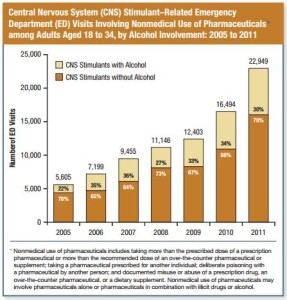
A local story in south Florida recently examined the issue among college students, where these amphetamines are often called “study drugs.” The college lifestyle is often filled with late nights and substance abuse of all kinds.
Despite any perceived short-term benefits from taking these drugs, there are much greater long-term risks. Factor in the increased availability of these drugs on the market through prescriptions, and you have a perfect recipe for disaster of kids trying to stay up late for studying and also using the drugs recreationally. Additionally, many kids are mixing these pills with alcohol and other drugs, creating even more of a risk.
According to the Substance Abuse and Mental Health Services Administration’s (SAMHSA) Drug Abuse Warning Network (DAWN), the number of Emergency Room visits involving central nervous system stimulants among adults aged 18 to 34 quadrupled in six years. The total went from 5,600 in 2005 to nearly 23,000 by 2011. The bulletin also specifically noted that when alcohol is also involved, the stimulants appear to hide the effects of alcohol consumption and people wind up drinking more as a result.
If you have a loved one abusing prescription stimulants or any other substance, contact Gulf Breeze Recovery today to find out more about our treatment program.






